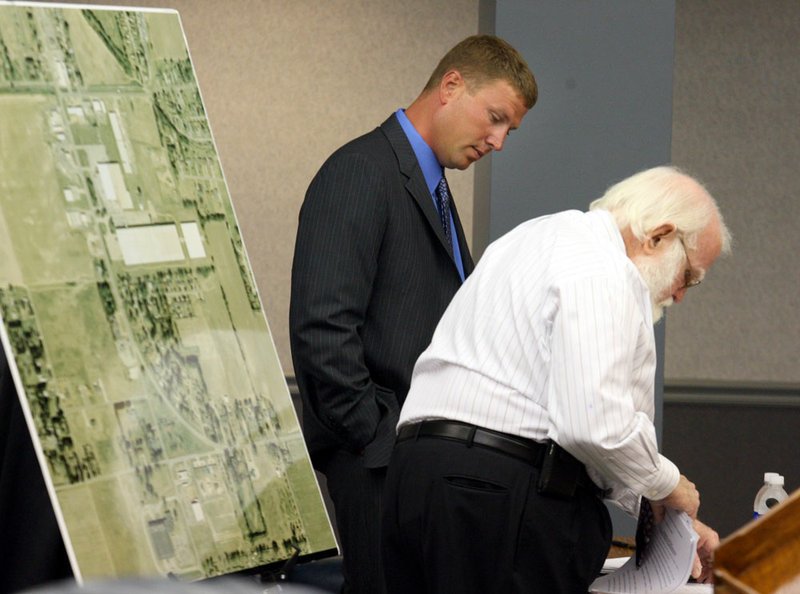LITTLE ROCK — The Arkansas State Police Commission on Thursday reinstated a state trooper involved in a 2009 fatal accident.
Andrew Rhew, 31, of Manila was fired by the new state police director, J.R. Howard, in May after Rhew pleaded no contest to a negotiated misdemeanor charge of negligent homicide in the Nov. 3, 2009, crash in which Vickie Freemyer, 52, of Blytheville died.
The seven-member State Police Commission voted unanimously Thursday to reinstate Rhew.
After a day-long hearing, Howard shook Rhew’s hand and congratulated him. Many troopers did the same.
Little Rock defense attorney Robert Newcomb presented evidence that Freemyer had failed to stop at a stop sign on a street parallel to Arkansas 77, where Rhew was traveling, and said her failure to stop caused the accident.
Retired Capt. Tommy Wicker testified at the state police headquarters hearing that “If she had not run the stop sign, there would not have been an accident.”
Wicker was Rhew’s boss at the time of the accident.
Newcomb said after hearing the commission’s verdict that “the prosecution tried to say the justification [for Rhew’s dismissal] was because of a fatality, without looking at what caused the accident.”
Attorney Greg Downs presented evidence on behalf of the state police and Howard. Rhew’s May 6 termination letter stated that he had been fired because of his actions on the day of the fatal crash.
The letter said Rhew exceeded the speed limit without turning on his emergency lights and siren, a violation of Arkansas law.
Rhew, who was responding to a police dispatch when the accident occurred, said Thursday afternoon that he didn’t know how fast his ve-hicle was traveling before the crash.
Commission Chairman John Allison asked Rhew how, if he were reinstated, he would be able to justify writing speeding tickets to others when he didn’t know how fast he was driving on the day of the crash.
Rhew answered that on that day, his focus was on traffic flow and maneuvering his patrol car through traffic.
A recording device in Rhew’s state police Dodge Charger indicated that his top speed that day was 103 mph. The device said Rhew was traveling 87 mph when his vehicle struck Freemyer’s Toyota Camry.
“I found no reason at all to doubt the validity of the speeds. The top speed at impact appears to be accurate,” said witness George Hall, a forensic engineer who specializes in crash recorder devices.
But witness Larry Williams, who reconstructs accidents, disagreed.
“I think Andy Rhew’s speed was somewhere between 68-72 miles per hour,” he testified. “The event recorder was not recording properly.”
Newcomb asked Howard, “If there had not been an accident, and a Manila officer had clocked him in at 100 miles per hour, would youhave fired him?”
“Would I have fired him? No,” Howard said.
Rhew had been dispatched to the Osceola driver’s license center 6 minutes before the crash because two people there had outstanding arrest warrants. Earlier that week, state troopers had received a memorandum telling them that there had been disturbances at the driver’s license site and to respond promptly.
“There was nothing in the email to suggest that department policy or state law should be ignored in responding to calls at the driver’s license sites,” Howard wrote in Rhew’s termination letter.
A handful of troopers testified Thursday that for various reasons, they often don’t turn on their emergency lights and sirens while speeding to respond to police calls. Sometimes the lights and sirens can be more dangerous because drivers stomp on their brakes,Capt. Keith Eremea said.
“It was an unfortunate result to a normal activity,” Capt. Rick Dickinson said of the crash.
Downs insisted that troopers should follow the law when responding to dispatches, saying that just because officers can disobey the law doesn’t make it OK.
But Lt. Robert Speer said, “Yes, we are all aware of what the state law says, but we can’t always perform our duties by following that law.”
Rhew was placed on administrative leave with pay after the accident, pending a review of the case.
He was fired in December by then-Director Winford Phillips for failing to follow state police policy and state law with regard to “operating his patrol car,” spokesman Bill Sadler said at the time.
In March, Phillips reversed the termination, saying it was “in the best interests of the Arkansas State Police” to stay hisdecision until Rhew’s criminal case was resolved.
Howard fired Rhew after Rhew’s no contest plea. Sentencing was suspended for a year, and Rhew’s record could be cleared if he has no further legal violations.
In recent years, two other officers have appeared before the commission.
The panel upheld the firing of Trooper Roderick Trotter Sr. in March 2008 after he admitted to making sexual overtures to two women during a traffic stop. In May 2008, the panel upheld the firing of Trooper Bradley Gilkey, 27, who was accused of falsifying time sheets while reporting overtime resulting from drunken-driving patrols.
Arkansas, Pages 11 on 07/15/2011
